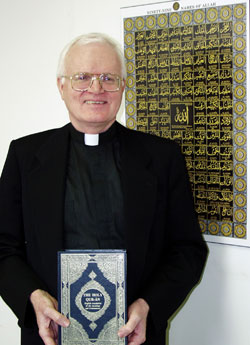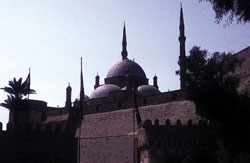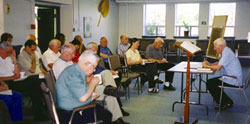City of the thousand minarets
Cairo was an experience of life in a Muslim country ...
an encounter with the enduring power of Islam
By Fr. David Warren, S.F.M.
January/February 2007
Return to Table of Contents
Print Article
I didn't need an alarm clock in Cairo. Before sunrise each morning, the call to prayer sounding forth from the minaret or tower of the nearby mosque awakened me. The muezzin who calls the faithful to prayer would begin, "Allah Akbar!" (God is Great!). In fact, five times each day he would sound forth the call to prayer.

Fr. Dave Warren holding the Qur'an. Behind him is a poster featuring the 99 Names of God (Allah).
In 2001 I began to learn about Islam. I read books about Islam and met individual Muslims, including and especially the kind Muslim gentleman who tutored me for a year in the Arabic language, the sacred language of Islam and of its holy book, the Qur'an. But I wanted to experience life in a Muslim country.
The opportunity to visit Cairo came through Fr. Douglas May, a Maryknoll priest from the United States who lives and works in Egypt. Each year Fr. May runs a course in the English language for students of the Catholic Coptic Seminary in Cairo. He recruits English native speakers from North America to work with him. I applied and was accepted as one of the teachers for the course and lived in Cairo for a month in the summer of 2006.
I felt some fear about going to Egypt. I was aware of the recent bombing in the city of Sharm el-Sheikh and the increasing power of the Muslim Brotherhood. This organization of Egyptian Muslims was founded in Egypt in 1928 and advocates that Egypt become an Islamic state, that is to say, a state based on Islamic Law or Shari'a. The organization is outlawed in Egypt.
However, arriving in Egypt, my fears were quickly dispelled. I found the Egyptians to be a friendly people and quite solicitous towards foreigners like myself. On the subway they would invite me to take an empty seat. Once when I was looking for a street in downtown Cairo, a young man who saw me looking around, stopped to help me.

The sun had just set in the west and the evening call to prayer began to rise from every minaret in Cairo. Allah Akbar!
CREDIT www.bigfoto.com/copyright.htm
Although Egypt is not officially an Islamic state, 90 percent of the country's 72 million people are Muslim. In North America, religion tends to be a private affair. In Egypt religion is very public. I have already referred to the call to prayer that sounds forth from the mosques five times a day. But on the subway I would see a good number of men reading the Qur'an. And during my late afternoon walks I would see men with their prayer beads, and often passed a security guard chanting the Qur'an by himself.
The Islamic character of Egypt is also apparent in the way women dress. Almost all Muslim women wear long dresses and the hijab (veil). A few even wear the burqua, an outer garment that covers everything except the eyes. The first two cars on the subway are for women only. (I'm glad someone told me that before I got onto the wrong car.) The Islamic character of Egypt is also apparent in the relative absence of alcohol. There are shops that are licensed to sell alcoholic beverages, but few eating-places serve alcohol. Islam also prohibits the eating of pork. Sausages in Egypt are made from beef, not pork.

Fr. Dave Warren (R) shares some of his learnings about Islam with his Scarboro community. Fr. Warren has been doing academic studies in the field of interfaith dialogue, and studying Arabic, in the hope of building bridges with Islam. After this day of study, the group visited a mosque. Toronto.
My most memorable experience in Egypt occurred one evening in El-Azhar Park overlooking the city of Cairo. The sun had just set in the west and the evening call to prayer began to rise from every minaret in Cairo. Allah Akbar! The call to prayer blotted out every other sound in the city. At that moment I understood why Cairo is called the City of the Thousand Minarets. At that moment I also felt the enduring power of Islam and the need to know it better.
After working in the Philippines and in Guyana, Scarboro missioner Fr. David Warren returned to Canada and began academic studies in Islam, the Arabic language and interreligious dialogue. He is committed to building bridges between Christians and Muslims. Together these two faith traditions form close to half of the global population; Muslims and Catholics form one-third of peoples worldwide.
Return to Table of Contents
Print Article